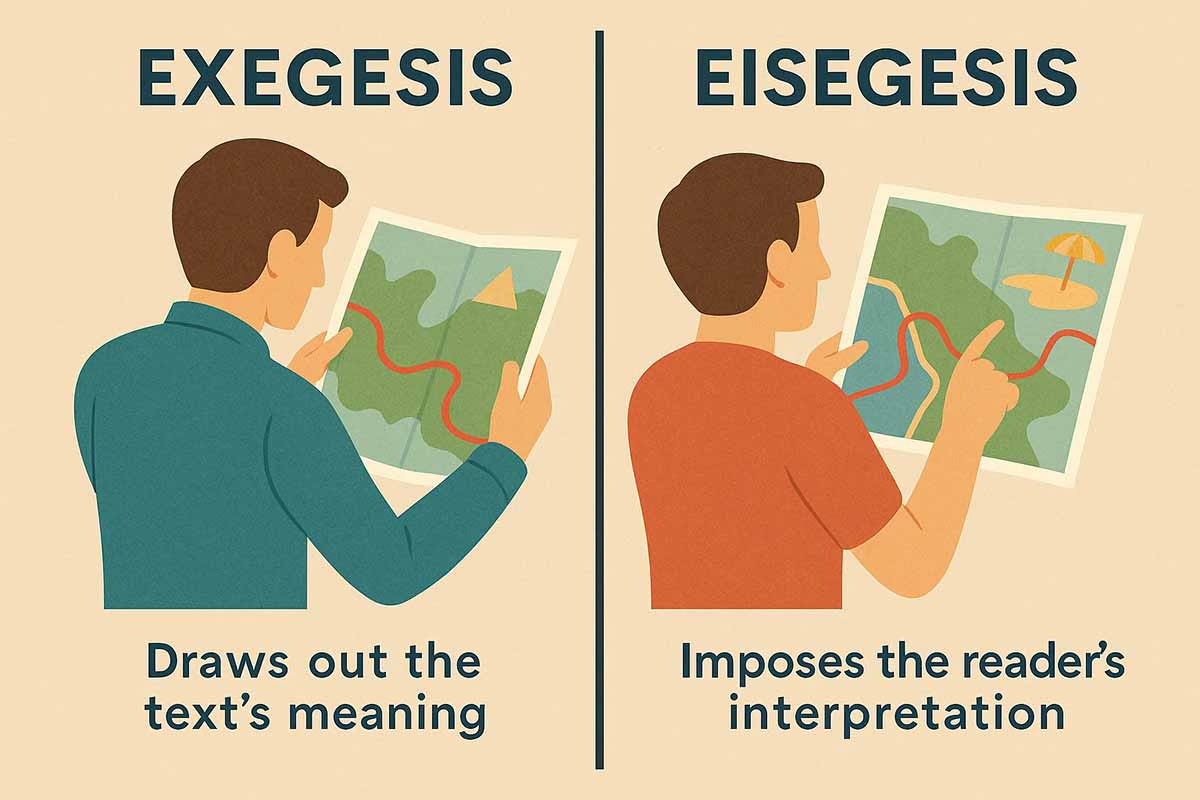The Bible is a Well, Not an Echo Chamber
Biblical Exegesis vs. Eisegesis: One’s a Bible Study, the Other’s a Therapy Session. I explain the differences and why one leads to Truth, while the other leads to confusion
The Church Fathers were experts at interpreting the Bible. This was partly due to their classical education and understanding of the language, culture, and style of the biblical authors. But even lesser-educated Fathers were mastkfuful exegetes (interpreters of scripture). But what they all had in common was they had the humility to listen to the scripture rather than pridefully talking over it. That’s what biblical exegesis is. But ‘talking over scripture’ is how many moderns RE-interpret the Bible today, putting their own interpretation over the intent of the author of the text. That’s biblical eisegesis and it leads to confusion rather than Truth.
Let’s talk about biblical exegesis and how it differs from eisegesis and why you should care.
What’s Eisegesis?
Eisegesis is when someone reads their own ideas or biases into the text. They see what isn’t actually there, or they distort what’s there to fit their needs. It isn’t always done with malice, but it always leads to interpretations that align with the reader’s preconceived notions or desires, instead of the original intent of the author, or purpose of the text.
You see this everywhere. Whenever you’re told “Don’t judge! Jesus himself said ‘Judge not, lest ye be judged’” you’ve gotten a healthy dose of biblical eisegesis. continues below
Follow me on: TikTok | Instagram | Catholic Experience Podcast (All Carriers)
What’s Exegesis?
Exegesis involves drawing out the text’s original meaning—like drawing water from a well—by analyzing its context, language, and the author’s intent. Exegesis is a more objective approach to interpreting scripture and seeks to understand what the text actually means.
In short; Exegesis draws meaning from the text while eisegesis pours meaning into a text.
Practical Application
I’ll explain how this works, using this widely recognized example of eisegesis
“I can do all things through Christ who strengthens me.”
– Philippians 4:13
Eisegetical (incorrect) Interpretation
People sometimes use this verse to mean, “I can accomplish anything I set my mind to—become a guitar hero, fly to the moon, land my dream job, blow up on Substack—because Christ gives me strength.”
My friends, I believe in Jesus Christ who strengthens me, but I will never be a musician, or an astronaut (and I’ll likely not blow up on Substack). Yet that passage is frequently used in motivational speeches, sports, and even marketing as a kind of divine guarantee for personal success.
This is a classic case of reading our desires and modern mindset into the text. It turns the verse into a Christianized self-help slogan about personal achievement and “crushing your goals”.
But that’s not what Paul was saying.
The Exegetical (Proper) Interpretation
If you read Philippians 4:11–13 in context, Paul is talking about enduring hardship:
"I have learned, in whatever situation I am, to be content... I know how to be brought low, and I know how to abound... I have learned the secret of facing plenty and hunger, abundance and need. I can do all things through him who strengthens me."
Paul isn't saying that he can conquer the world—he’s saying that through Christ, he can endure any circumstance, whether it's suffering, poverty, or success, without losing faith or peace.
So, no, we can’t crush our goals because Jesus backs us. That’s eisegesis. It puts our modern, success-oriented worldview into the text, instead of drawing out what Paul actually meant.
Interpreting scripture should be like reading a history book. We never tell a history book “This is what you mean” but rather we receive what the history book is presenting. Why? Because you can’t change history. Neither can you change the Truth. God has revealed Truth in the sacred scripture. It isn’t a bunch of letters that we can use to form our own sentence, like a game of Scrabble. We have to read what’s there and listen to what God is telling us through the text.
I hope you enjoyed this. If you did, please tap “Like” or leave a comment because engagement tells me what you enjoy, and it tells Substack that the content is worth distributing to others who aren’t already following my work.
If you’re not already subscribed, please consider it, so that you can stay informed of the great work I publish here. If your’e already subscribed, consider becoming a paid subscriber for an enhanced experience and bonus content.
Follow me on: TikTok | Instagram | Catholic Experience Podcast (All Carriers)
God be with you all!






